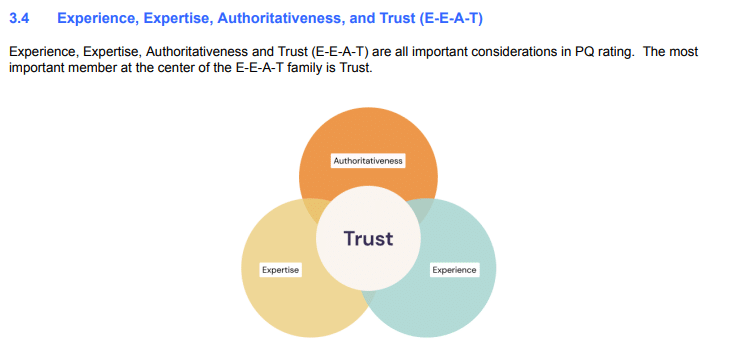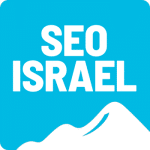Experience, Expertise, Authoritativeness, Trustworthiness = Page quality
E.E.A.T is one of the factors that determine the quality of the page.
And indirectly, how much Google believes it can trust your site, in the pursuit of giving users the best answer to what they were looking for.
Google looks at EEAT on two levels:
- on a specific landing page.
- on the whole site. That is, not only on one landing page which is good, but on the E.E.A.T components of the entire site, such as an about page, a page of a team member or of the site’s content creator.

E.E.A.T is a follow-up concept to YMYL so if you haven’t read it yet, we recommend you take a look and then come back.
Once it is determined that the page has a useful purpose, its E.E.A.T level is determined according to whether the page is considered a YMYL
YMYL = Your money your life – content which, if misleading, can have a negative impact on the reader’s life and is therefore written by experts. Content that is not YMYL will be examined less strictly.
Let’s break down the concepts:
Experience (E): Refers to the author of the main content on the page – does he/she have first-hand / life experience in this topic? Are they writing out of personal experience or describing something they heard of? this point closely relates to the next.
Expertise (E): Refers to the author of the main content on the page – is he/she an expert on the subject? Do they have certificates that can be presented if necessary? And is the information about them available on the website? You don’t have to display all the information on the content page, but you can link to the author’s page and display his name, photo, certificates, professional information, etc.
*Non-YMYL content of the “everyday expertise” type does not require certificates or training.
In addition, the standard for expertise depends on the topic of the page. For example, a person who writes detailed and helpful restaurant reviews has everyday expertise if he goes to restaurants often and loves food.
Authority (A): Refers to:
- The content writer.
- The content itself.
- and the site where the content appears.
Trustworthiness (T): also refers to:
- The content writer.
- The content itself.
- and the site where the content appears.
Being an expert and a trusted source of knowledge means that users can trust you to provide correct, truthful and accurate information.
Additional instructions for YMYL pages that require a high E.E.A.T and must be written by experts:
- medical advice
- journalistic news stories.
- Information pages on scientific topics.
- Advice: legal, financial, related to taxes.
- Advice pages on valuable topics such as: home renovation, parenting, etc.
- Pages about hobbies that require expertise such as: photography, playing the guitar.
The benefits of following E.E.A.T.:
Websites that highlight their E.E.A.T indicators gain not only the trust of Google but also the trust of users which can lead to increased sales.
Additional ways to increase E.E.A.T to users:
- Opening a Google My Business card.
- Highlight the promise of a page that will increase buyers’ sense of security on your site.
- Create a contact page/element so that the users feel safe that if there is a problem there will be someone to talk to. The key here is a sense of security and authority.
- Security logos like lock, Visa, Mastercard.


